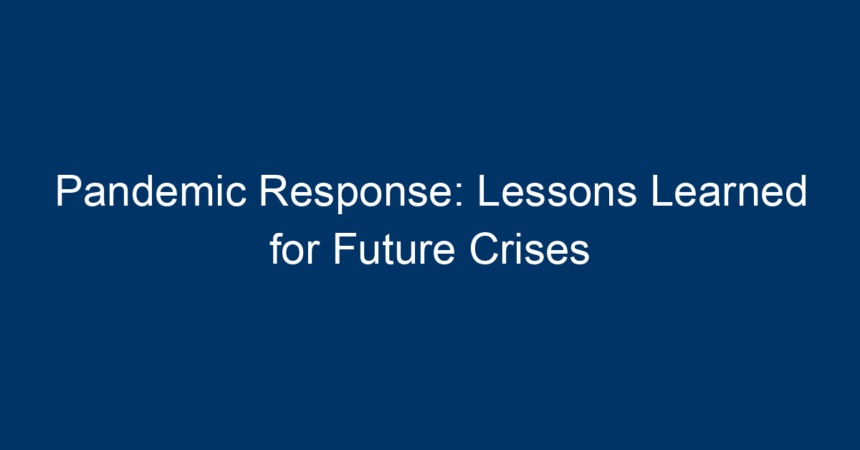The COVID-19 pandemic has undeniably changed the world in profound ways. From healthcare systems to global economies, every aspect of life was challenged as countries rushed to respond to an unprecedented crisis. While we grapple with the ongoing effects of the pandemic, it is crucial to analyze the lessons learned from our pandemic response. By understanding these lessons, we can better prepare for future crises, ensuring that we emerge stronger and more resilient.
The Importance of Preparedness
One of the glaring lessons from the pandemic is the critical need for preparedness. Many nations faced significant challenges due to a lack of resources and planning. Here are several key areas where preparedness is essential.
Strategic Stockpiles
The initial response to COVID-19 revealed gaps in national stockpiles of personal protective equipment (PPE) and medical supplies. Governments realized the importance of maintaining sufficient emergency supplies. Moving forward, countries should regularly assess and replenish these stockpiles, ensuring they remain ready for future emergencies.
Robust Emergency Plans
Effective pandemic response requires well-defined emergency plans that are regularly updated and practiced. Engagement in large-scale simulations can prepare healthcare systems and governments for various crisis scenarios. Countries with established response frameworks were better equipped to handle the chaotic nature of a pandemic.
Investment in Public Health Infrastructure
A strong public health infrastructure is the backbone of any effective pandemic response. During COVID-19, nations with robust healthcare systems fared better than those without. Investment in health infrastructure, including hospitals, laboratories, and workforce training, is vital for future crisis management.
The Role of Communication
Communication emerged as a paramount element in managing public perceptions and behaviors during the pandemic. The lessons learned in this area are as crucial as those related to preparedness.
Transparent Messaging
Clear and transparent communication from government officials and health organizations can build public trust. Conflicting messages can lead to confusion and resistance. Future pandemic responses should prioritize clear, consistent messaging that evolves based on scientific evidence.
Engaging the Community
Community engagement is a cornerstone of effective pandemic response. Involving community leaders and organizations can help disseminate vital information and encourage adherence to public health guidelines. This grassroots approach fosters trust and compliance, ultimately enhancing response efforts.
Leveraging Technology
The pandemic hastened the adoption of technology in various sectors, illustrating its potential for enhancing a crisis response. Here are some key technological takeaways.
Telehealth Expansion
The rapid expansion of telehealth services during the pandemic demonstrated how technology can facilitate healthcare access. Telehealth can alleviate pressure on healthcare systems, making it an essential component of future pandemic responses. Investing in telehealth technology and infrastructure is vital for efficiency in forthcoming crises.
Data Analytics and Modeling
Data analytics played a crucial role in understanding the spread of the virus. Governments and health organizations must adopt advanced data modeling tools and methodologies to predict potential outbreaks and inform their pandemic response strategies. Timely access to accurate data can make all the difference in managing future crises.
Vaccine Development and Distribution
The success of the COVID-19 vaccine rollout highlighted the importance of a coordinated approach to vaccine development and distribution. Future pandemic responses should establish frameworks to expedite vaccine research, production, and distribution when needed. Collaborations among governments, pharmaceutical companies, and global health organizations are critical in this respect.
Equity in Pandemic Response
The COVID-19 pandemic shed light on existing inequalities and disparities in healthcare systems worldwide. Future responses must prioritize equity to ensure comprehensive protection for all communities.
Addressing Vulnerable Populations
Identifying and addressing the needs of vulnerable populations is crucial for an effective pandemic response. Special attention should be given to marginalized groups who often face barriers to healthcare access. Ensuring that resources and support networks reach these groups can help mitigate the impact of future crises.
Global Cooperation
The pandemic highlighted the importance of global cooperation and solidarity. Countries must work collaboratively, sharing resources, information, and expertise. Future pandemic responses should encourage international partnerships to ensure a united front against global health crises.
Psychological Aspects of Pandemic Response
The psychological impacts of a pandemic are as significant as the physical effects. Understanding mental health’s role in pandemic response is vital for future preparations.
Mental Health Support
During COVID-19, many individuals experienced anxiety, depression, and isolation. Future responses must prioritize mental health services and support systems to help people cope with crises. This includes training healthcare providers to recognize and address mental health issues and facilitating access to mental health resources.
The Role of Community Initiatives
Community initiatives can bolster mental health support during a pandemic. Peer support groups and mental health campaigns can foster a sense of belonging and resilience. Integrating mental health resources into pandemic response frameworks can help address the emotional toll of crises.
Conclusion: Actionable Insights for Future Pandemics
The lessons learned from our pandemic response during COVID-19 are invaluable. As we look to the future, it’s imperative that governments, health organizations, and communities work together to ensure we are better prepared.
Key Recommendations:
-
Enhance Preparedness: Invest in strategic stockpiles, robust emergency plans, and public health infrastructure.
-
Foster Communication: Prioritize transparent messaging and community engagement to build public trust.
-
Leverage Technology: Expand telehealth and utilize data analytics to inform responses and streamline vaccine distribution.
-
Promote Equity: Ensure resources reach vulnerable populations and encourage global cooperation in health initiatives.
- Address Mental Health: Incorporate mental health support and community initiatives into pandemic response frameworks.
By embracing these lessons learned, we can develop a comprehensive pandemic response strategy that not only mitigates the impacts of future crises but also promotes resilience, equity, and well-being for all. In the end, the world’s united effort to learn from COVID-19 will determine our capability to confront future challenges head-on.




